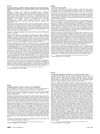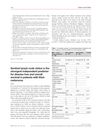 September 2023 in “International journal of women’s dermatology”
September 2023 in “International journal of women’s dermatology” Certain hairstyles, diabetes, scalp infections, and vitamin D deficiency may increase the risk of hair loss in Black women; more research is needed for better treatment.
 September 2023 in “Cureus”
September 2023 in “Cureus” Topical finasteride might be a good alternative for hair loss treatment with fewer side effects, but more research is needed.

Certain natural products may help stimulate hair growth by affecting stem cell activity in the scalp.
[object Object]  February 2021 in “International journal of men's social and community health”
February 2021 in “International journal of men's social and community health” Bald men's facial expressions are seen more negatively, and many men are dissatisfied with their bodies, including hair loss.
Higher levels of certain proteins in hair loss areas may help understand and treat hair loss.
 May 2015 in “Hair transplant forum international”
May 2015 in “Hair transplant forum international” Androgenetic alopecia causes hair loss by shrinking hair follicles due to androgens, with the connection between the muscle and hair follicle determining if the loss is reversible.
 63 citations,
May 2017 in “American Journal of Clinical Dermatology”
63 citations,
May 2017 in “American Journal of Clinical Dermatology” People with alopecia areata often have lower levels of vitamin D, zinc, and folate, but more research is needed to understand if supplements can help treat it.
 August 2024 in “Journal of Cosmetic Dermatology”
August 2024 in “Journal of Cosmetic Dermatology” Injectable treatments can effectively and safely improve hair growth in adults with androgenetic alopecia.
 June 2024 in “Skin Research and Technology”
June 2024 in “Skin Research and Technology” Botulinum toxin treatment improves hair follicle width and length in androgenetic alopecia.
 April 2017 in “Journal of dermatology & cosmetology”
April 2017 in “Journal of dermatology & cosmetology” The marine protein complex, Viviscal®, was found to effectively reduce hair loss and improve hair, skin, and nails quality in women.

Korean patients with androgenetic alopecia may have a higher risk of heart-related health issues and could benefit from early heart screening and healthier lifestyles.
 September 2024 in “Current Oncology”
September 2024 in “Current Oncology” Docetaxel often causes hair loss, with limited effective treatments and no cure for permanent hair loss.
 June 2023 in “International Journal of Research in Dermatology”
June 2023 in “International Journal of Research in Dermatology” Weight loss from bariatric surgery improved certain skin conditions.
 4 citations,
February 2022 in “JAAD case reports”
4 citations,
February 2022 in “JAAD case reports” The document concludes that low-dose oral minoxidil successfully regrew hair in a patient with permanent hair loss after chemotherapy and stem cell transplant.
 September 2020 in “Journal of Investigative Medicine”
September 2020 in “Journal of Investigative Medicine” Omics techniques are needed to understand the scalp microbiome's role in alopecia areata for new treatments.
 2 citations,
January 2023 in “International Journal of Biological Sciences”
2 citations,
January 2023 in “International Journal of Biological Sciences” A specific pathway involving AR, miR-221, and IGF-1 plays a key role in causing common hair loss.
 218 citations,
April 2012 in “British Journal of Dermatology”
218 citations,
April 2012 in “British Journal of Dermatology” Guidelines suggest various treatments for alopecia areata, but leaving it untreated is also an option as 80% cases may recover on their own.
 54 citations,
August 2019 in “Bioscience trends”
54 citations,
August 2019 in “Bioscience trends” Stem cells help repair tissue mainly by releasing beneficial substances, not by replacing damaged cells.
 15 citations,
March 2014 in “Body Image”
15 citations,
March 2014 in “Body Image” Wig users with alopecia do a lot of emotional and practical work to make their wigs look natural and manage how others see them.
 June 2023 in “Skin Research and Technology”
June 2023 in “Skin Research and Technology” Using platelet-rich plasma injections and 5% minoxidil topically can safely and effectively treat mild-to-moderate male pattern baldness.
[object Object]  8 citations,
July 2021 in “Patient Preference and Adherence”
8 citations,
July 2021 in “Patient Preference and Adherence” Alopecia treatments improve life quality but side effects can lessen this benefit; better use of quality of life measures is needed.
 10 citations,
January 2023 in “Journal of the European Academy of Dermatology and Venereology”
10 citations,
January 2023 in “Journal of the European Academy of Dermatology and Venereology” Alopecia areata greatly affects people's life quality, mental health, and work life.
 July 2023 in “International Journal of Cosmetic Science”
July 2023 in “International Journal of Cosmetic Science” Biopolymers are increasingly used in cosmetics for their non-toxicity and skin benefits, with future biotech advancements likely to expand their applications.
 December 2023 in “European Journal of Psychology Open”
December 2023 in “European Journal of Psychology Open” Men who are perfectionists feel more upset about baldness, partly due to aging anxiety.
 June 2024 in “Computational and Structural Biotechnology Journal”
June 2024 in “Computational and Structural Biotechnology Journal” Multi-omics techniques help understand the molecular causes of androgenetic alopecia.
 February 2021 in “International journal of men's social and community health”
February 2021 in “International journal of men's social and community health” Online forums help understand men's concerns about baldness and show the need for better support that changes how baldness is viewed.
 May 2011 in “Journal of The American Academy of Dermatology”
May 2011 in “Journal of The American Academy of Dermatology” Objective assessment is needed to accurately determine medication use and adherence.
 2 citations,
May 2014 in “Journal of The American Academy of Dermatology”
2 citations,
May 2014 in “Journal of The American Academy of Dermatology” Melanoma thickness at diagnosis is linked to access to dermatologists and preventive services, not to socioeconomic status.
 1 citations,
December 2012 in “Journal of the European Academy of Dermatology and Venereology”
1 citations,
December 2012 in “Journal of the European Academy of Dermatology and Venereology” The health of the sentinel lymph node is the best indicator of survival for patients with thick skin cancer.
 January 2023 in “Annali di stomatologia”
January 2023 in “Annali di stomatologia” PRP helps heal and repair tissues in medicine but needs more research for better use.




























